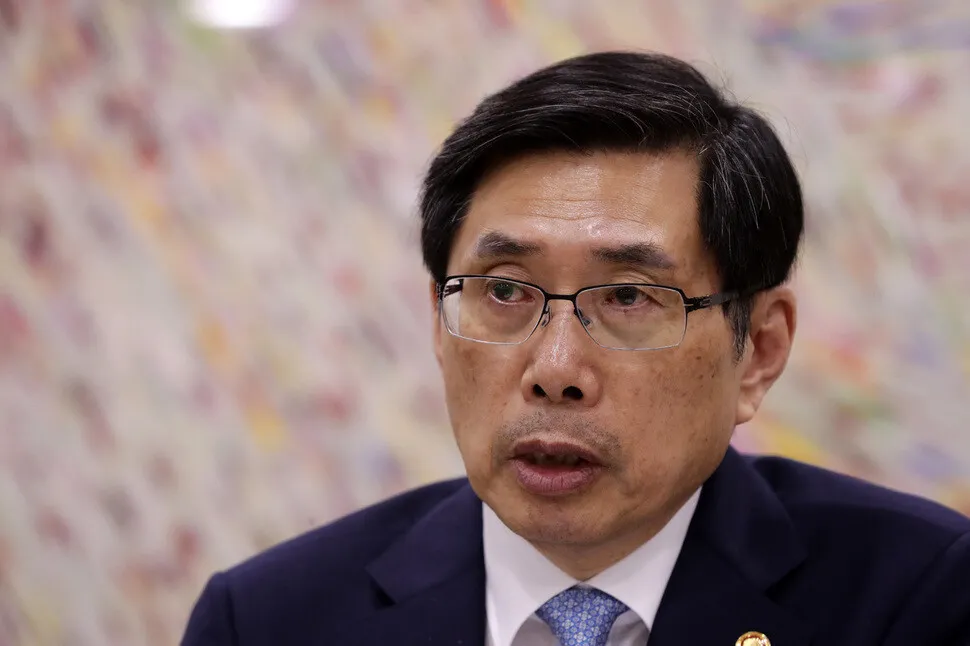hankyoreh
Links to other country sites 다른 나라 사이트 링크
Justice minister announces establishment of new refugee review tribunal

Justice Minister Park Sang-ki announced on Aug. 1 that a new refugee review tribunal would be established to reduce the amount of time needed for status reviews to within one year.
While appearing on the Blue House social media program “11:50 at the Blue House” that day, Park responded to a citizens’ petition stating, “We request the abolition of the Refugee Act, visa-free entry, and refugee application permits and demand amendment of the Constitution after the illegal refugee application issue on Jeju Island.” The petition has received 714,875 signatures amid the recent increase in arrivals of asylum seekers from Yemen.
“In connection with the amount of the refugee reviews take, the government plans to substantially increase the currently inadequate numbers of review personnel and interpreting experts, as well as specialized staff for collection information on national circumstances,” Park explained in response.
“In particular, we will be instituting a refugee review tribunal with expertise and independence,” he added.
“When this happens, the review period, which currently lasts two to three years if noncompliance procedures are included, will be reduced to within one year,” he predicted.
Park also stressed that “true refugees will be protected, while fraudulent refugee applications will be swiftly weeded out.”
His remarks represent the South Korean government’s first explicit statement of a position on the Jeju refugee issue.
“Reviews for the Yemeni refugee applicants on Jeju island will be completed around late September,” Park said.
Addressing concerns about a growing number of fraudulent asylum seekers, Park said, “We will be conducting rigorous reviews extending not only to the reasons for persecution but also to drug testing, contagious diseases, and histories of major criminal acts.”
“We will also be considering not referring applicants for official refugee review procedures when they are clearly abusing the refugee system,” he added.
Park further announced plans to “stipulate provisions for the punishment of refugee brokers who are encouraging illegal activity.”
Responding to calls for abolition of the visa-free entry system on Jeju Island, Park said, “While there have been some side effects, there are also those who see [the system] as having helped promote Jeju tourism.”
“We will consult closely with Jeju Island on the matter,” he continued.
“Since Yemeni nationals were barred from visa-free entry on June 1, the South Korean government has additionally designated 12 other countries since Aug. 1 that are also prohibited, including The Gambia and Somalia.”
In 1992, South Korea became a party to the Convention Relating to the Status of Refugees, which guarantees the human rights and basic liberties of refugees. South Korea’s refugee protection rate of 11.4 percent falls well below the 38 percent average of other parties to the convention around the world.
By Seong Yeon-cheol, staff reporter
Please direct comments or questions to [english@hani.co.kr]

Editorial・opinion
![[Editorial] International cooperation will make or break Lee’s ‘END’ initiative [Editorial] International cooperation will make or break Lee’s ‘END’ initiative](https://flexible.img.hani.co.kr/flexible/normal/500/300/imgdb/original/2025/0924/421758698492342.jpg) [Editorial] International cooperation will make or break Lee’s ‘END’ initiative
[Editorial] International cooperation will make or break Lee’s ‘END’ initiative![[Guest essay] Decarbonization and demilitarization of Korea must go hand in hand [Guest essay] Decarbonization and demilitarization of Korea must go hand in hand](https://flexible.img.hani.co.kr/flexible/normal/500/300/imgdb/original/2025/0923/9917586075343211.jpg) [Guest essay] Decarbonization and demilitarization of Korea must go hand in hand
[Guest essay] Decarbonization and demilitarization of Korea must go hand in hand- [Column] ‘They make a desolation and they call it peace’
- [Editorial] Public has right to know PPP’s relationship with Unification Church
- [Column] The model students of empire selling out Korea
- [Editorial] Korea must not allow itself to be rushed into a bad trade deal with US
- [Column] Imperial tyranny, Korean humiliation
- [Correspondent’s column] Cognitive dissonance in MAGA world
- [Editorial] Korea, US need a ‘gentlemen’s agreement’ on what job creation entails
Most viewed articles
- 1Korea’s own MAGA evangelist brings American far right to Korean church youth
- 2[News analysis] Kim Jong-un names his price for dialogue: Recognition as a nuclear state
- 3[Interview] Michael Sandel on how meritocracy can fuel crises of democracy
- 4Lee unveils plan to ‘END’ hostility on Korean Peninsula via exchange, normalization, denuclearizatio
- 5‘The Silent Weapon’ wins top prize at 2025 Hinzpeter Awards for report on wartime sexual violence in
- 6Following the money: Investigators seek to verify if Unification Church cash reached Yoon
- 7It’s time for South Korea to reset its policy on North Korea, experts say
- 8[Editorial] International cooperation will make or break Lee’s ‘END’ initiative
- 9Aricell CEO handed 15-year prison sentence for deaths of 23 workers in battery plant fire
- 10For survivor, Jeju April 3 massacre is a living reality, not dead history